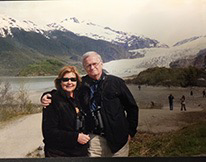Math Department Mourns Loss of David Arnold
 Dr. David M. Arnold, former Ralph and Jean Storm Chair of Mathematics and a distinguished emeritus professor at Baylor, passed away peacefully at his home on January 3. He was 81 years old.
Dr. David M. Arnold, former Ralph and Jean Storm Chair of Mathematics and a distinguished emeritus professor at Baylor, passed away peacefully at his home on January 3. He was 81 years old.
Dr. Arnold was born on August 9, 1939 in Falls City, Nebraska. He earned his B.A. in mathematics from Wichita State University in 1962 and his M.A. in mathematics from Western Washington State University in 1965. That year, he began his Ph.D. studies at the University of Illinois Urbana-Champaign and, in 1969, he completed his Ph.D. degree under the supervision of Joseph Rotman.
Dr. Arnold began his professional mathematical career as a post-doctoral Research Associate at New Mexico State University in 1968. NMSU subsequently hired Dave as an Assistant Professor in 1969. In 1974, he was promoted to Associate Professor and, in 1980, earned Full Professorship at NMSU.
Dr. Arnold held visiting positions at the University of Washington, the University of Connecticut, University of Essen (Germany), and Florida Atlantic University.
In 1990, under the leadership of Chair Dr. Howard Rolf, Baylor University hired Dr. Arnold as the Ralph and Jean Storm Chair of Mathematics, a position that he held until his retirement in 2015, when he was named Professor Emeritus of Mathematics.
Dr. Arnold was an ideal hire by Baylor in 1990 to vitalize and help build the mathematics program at Baylor University. Not only was he a first-class researcher but he had natural leadership skills and a calming way of giving counsel and advice which were influential in changing the department's focus from a teaching department to a teaching and research department. Dr. Arnold played a key role in securing our Ph.D. program by undertaking the task of writing the proposal which was presented to the Regents in 2000. He had a special talent for writing and the mark of his superb writing skills is still clearly visible on many of our department documents and policies.
Dr. Arnold was widely known for his research in torsion-free abelian groups of finite rank and related subjects, such as representation of finite partially ordered sets, modules over discrete valuation rings, subrings of algebraic number fields, and finitely generated modules over pullback rings. He had more than 80 journal publications in addition to five books on the subject. In addition, he supervised five Ph.D. students during his career and a countless number of undergraduate theses and projects.
Dr. Arnold's first book, Finite Rank Torsion-free Abelian Groups and Rings (Lecture Notes in Mathematics 931, Springer-Verlag, New York, 1982) is a "tour de force" and still considered the main source for experts and non-experts in the field.
In addition, Dr. Arnold is a co-author of a paper (Global Azumaya Theorems in Additive Categories (with R. Hunter and F. Richman), J. Pure Appl. Algebra 16 No. 3 1980, 223-242) which was part of the sequence of papers leading to the classification of Warfield groups which, at the time, was considered one of the most important advances in the general classification theory of finite groups.
Dr. Manfred Dugas, a Baylor colleague, who collaborated with Dr. Arnold on more than a dozen articles, remarks "Dave was a terrific colleague. It was my great pleasure and honor to be able to work with him on numerous research projects in the theory of torsion-free abelian groups of finite rank," an area that Dr. Dugas says that Dr. Arnold was the world leader. Beginning with what became known as "Arnold duality" in the early 1970's, he made a series of fundamental contributions that changed the face of torsion-free theory.
Dr. Fritz Gesztesy, a Baylor colleague who followed Dr. Arnold in the role of Ralph and Jean Storm Chair of Mathematics, observed that he was an internationally acclaimed mathematician who considerably raised the bar for all future Storm Chair holders and thus left a lasting legacy in the department.
Dr. Arnold was a driving force in the department to promote research, long before Baylor reset its focus towards research. His research was supported, continuously by the National Research Foundation, from 1974-1986. He obtained additional NSF support in 1988-1989. After his arrival at Baylor in 1990, he and Dr. Dugas were the recipients of two additional NSF grants in 1991-1992 and 1994-1995.
Dr. Arnold was a devoted and dedicated teacher and enjoyed teaching a wide variety of mathematics courses. He was instrumental in developing, and teaching, MTH 1301 (Ideas in Mathematics), MTH 4312 (Cryptography) and MTH 4313 (Number Theory). His classes were popular and students understandably were drawn to him. He deeply cared for Baylor students whether they were mathematics majors or filling a general mathematics requirement. He strongly encouraged excellence in teaching and, through his example, set a high standard for the department.
 Dave is well loved by his wife Betty, 5 children, 13 grandchildren and 6 great grandchildren. His non-mathematical passions were love of family, reading, and birding that took him into nature where he loved to spend time.
Dave is well loved by his wife Betty, 5 children, 13 grandchildren and 6 great grandchildren. His non-mathematical passions were love of family, reading, and birding that took him into nature where he loved to spend time.
Together with the Arnold family, the department mourns the loss of our beloved colleague, Dr. David Arnold. Our heartfelt sympathy and condolences to his wife, Betty, and their family.